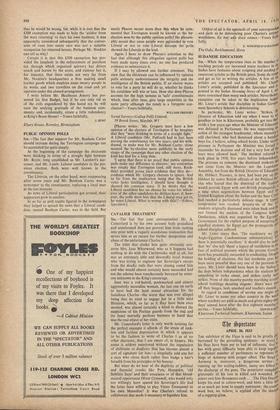CAVALIER TREATMENT
SIR,—The fact that your correspondent Mr. A. Comerford is by his own account both prejudiced and uninformed does not prevent him from rushing into print with a vaguely scandalous insinuation that serves him as an excuse for further denigration and abuse of the unfortunate Charles I.
The titbit that eludes him quite obviously con- cerns Mrs. Jane Whorwood, who as it happens had nothing to do with the Carisbrooke staff at all, but was an extremely able and devotedly loyal woman who was trying to engineer her Sovereign's escape from the deadly toils that were closing round him and who would almost certainly have succeeded had not the scheme been treacherously betrayed by some- one unknown in the King's entourage.
Jane was a red-haired, pockmarked and almost aggressively masculine woman, the last one on earth to have had the least sexual attraction for the fastidious Charles—the worst that was ever alleged being that he tried to engage her in a little mild flirtation, which, so far as it filmy have been even mooted, was almost certainly a blind to distract the suspicions of his Puritan guards from the real and (to Jane) mortally perilous business in hand that was the real object of her visits.
Mr. Comerford's letter is only worth noticing for the perfect example it affords of the strain of reck- less and factless depreciation in which it appears to be the fashion to write of Charles I as of no other character, that I am aware of, in history. His name is seldom mentioned without the imputation of shiftiness or duplicity that has become almost a sort of signature for him—a singularly odd one for a man who chose death rather than budge a hair's breadth from his principles or his honour.
But when do we hear of the duplicity of political and financial crooks like Pym, Hampden, 'old Subtlety Saye' and their associates or of that blood- stained opportunist Oliver Cromwell, who would only too willingly have spared his Sovereign's life had the latter been willing to play Victor Emmanuel to his own Mussolini? It was Charles's refusal to collaborate that made it necessary to liquidate him. eat itIr
Oddest of all is the spectacle of your correspon and such as he denouncing poor Charles's unti worthiness. Ex hoc utii5 disce onmes.—Yours fully,
E. WINGFIELD-STRA 1 f




























 Previous page
Previous page